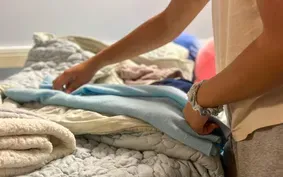
Ninth grader helps restore Mississippi’s oyster reefs
Clip: 6/23/2024 | 4m 17sVideo has Closed Captions
Meet the ninth grader who’s helping restore Mississippi’s oyster reefs
In the past two decades, the oyster population in Mississippi’s Gulf waters has been devastated by both natural and manmade disasters. Among those working to restore oyster habitats is ninth grader Demi Johnson, who was recently recognized by the National Geographic Society for growing more than 1,000 oysters, which are likely to spawn millions more. John Yang speaks with Johnson about her work.
Problems with Closed Captions? Closed Captioning Feedback
Problems with Closed Captions? Closed Captioning Feedback
Major corporate funding for the PBS News Hour is provided by BDO, BNSF, Consumer Cellular, American Cruise Lines, and Raymond James. Funding for the PBS NewsHour Weekend is provided by...

Ninth grader helps restore Mississippi’s oyster reefs
Clip: 6/23/2024 | 4m 17sVideo has Closed Captions
In the past two decades, the oyster population in Mississippi’s Gulf waters has been devastated by both natural and manmade disasters. Among those working to restore oyster habitats is ninth grader Demi Johnson, who was recently recognized by the National Geographic Society for growing more than 1,000 oysters, which are likely to spawn millions more. John Yang speaks with Johnson about her work.
Problems with Closed Captions? Closed Captioning Feedback
How to Watch PBS News Hour
PBS News Hour is available to stream on pbs.org and the free PBS App, available on iPhone, Apple TV, Android TV, Android smartphones, Amazon Fire TV, Amazon Fire Tablet, Roku, Samsung Smart TV, and Vizio.
Providing Support for PBS.org
Learn Moreabout PBS online sponsorshipJOHN YANG: Over the past two decades, the oyster population in Mississippi's Gulf waters has been devastated by natural and manmade disasters, including Hurricane Katrina, and the Deepwater Horizon oil spill.
Among those working to restore oyster habitats, called oyster reefs is a ninth grader named Demi Johnson.
The National Geographic Society recently recognized her work over the past two years, growing more than 1,000 oysters.
And those oysters are likely to spawn millions more in the years to come.
Recently, I spoke with Demi and asked her what goes into an oyster farm.
DEMI JOHNSON: First, you obviously oysters and appear to do it off of and you need cages.
And you need to be able to do weekly maintenance on these wasters.
JOHN YANG: What does it take to sort of raise oysters?
I mean, you don't plant them, you don't put them in the in the crowd like seeds, how does it work.
DEMI JOHNSON: So you're going to put oysters in a cage, and then you're going to have a room and you're going to tie it to the outside part of a pier.
And naturally, if you were to drop these cages in, well, they're tucked up, they're going to be just kind of in the water.
Honestly, when it comes to like maintaining or taking care of once a week is fine, just to shake the cages and to get the critters out because they are seen as a food source to other animals.
Once I'm done with the oyster gardening, they are dumped out into another area and they start to become their own reef.
JOHN YANG: How did you get started this?
How did you get interested in it?
DEMI JOHNSON: So I found out about this to my Girl Scout troop simply from my Girl Scout leader.
So there's a thing called a silver award and you have to do a project for your community, something community based, and she just kind of put it up in the air.
She was like, Hey, you can do Oestergaard and get my peer.
And I was like, okay, I'll do it.
Like, it doesn't sound too bad.
And you know, it's something easy for me to do.
JOHN YANG: And then a researcher at Auburn University, found out about you I understand, and it has actually become a mentor, what have you gotten out of working with her?
DEMI JOHNSON: I find a bunch of information about oyster gardening.
So when I first started oyster gardening, or storing this product, I had no clue about this, I only thought oysters can be eaten.
I didn't know they can be used for restoration.
So I was able to learn a lot through her.
And she was able to keep in contact with me.
And I've been able to learn more and more and more opportunities have been given to me.
JOHN YANG: When this began, you really had no idea about this, and you've learned a lot.
What's the coolest thing you've learned?
DEMI JOHNSON: I think the coolest thing I've learned is that oysters actually serve as a filter in the water.
I did not know that.
And they actually can serve as a home to over 300 species in the water.
So that's just typical.
JOHN YANG: How does it make you feel that you're, you're teaching people about this?
DEMI JOHNSON: It's really cool, because I went from having little to no background about this topic to knowing a lot more than I did.
So I just think that's like super cool.
And I'm happy that people want to learn more.
JOHN YANG: Where does this project go from here?
DEMI JOHNSON: Well, in September, oyster season will be starting.
And I'm going to go from five cages like I did last season to nine cages.
So just expanding.
JOHN YANG: As this affected what you think you might want to study in college and maybe what you want to do as a career?
DEMI JOHNSON: Yes.
So I want to attend University of Michigan and specifically I want to major in environmental law.
And once I'm done with that career rise, I want to represent environmental groups.
JOHN YANG: Demi Johnson, oyster farmer, thank you very much.
How private firms profit from veterans’ disability claims
Video has Closed Captions
Clip: 6/23/2024 | 7m 6s | What to know about the private firms illegally profiting from veterans’ disability claims (7m 6s)
How to reduce the number of teens aging out of foster care
Video has Closed Captions
Clip: 6/23/2024 | 5m 7s | How Arizona aims to reduce the number of teens aging out of foster care (5m 7s)
Why little is known about what causes many miscarriages
Video has Closed Captions
Clip: 6/23/2024 | 4m 4s | Why little is known about what causes many pregnancies to end in miscarriage (4m 4s)
Providing Support for PBS.org
Learn Moreabout PBS online sponsorshipSupport for PBS provided by:
Major corporate funding for the PBS News Hour is provided by BDO, BNSF, Consumer Cellular, American Cruise Lines, and Raymond James. Funding for the PBS NewsHour Weekend is provided by...














